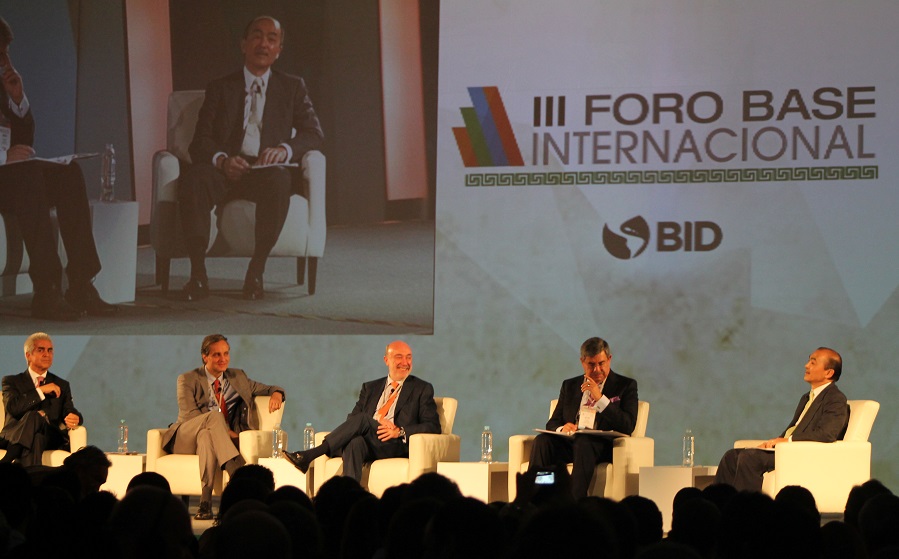Key takeaways from the BASE III FORUM
From June 29th to July 1st the third version of Base Forum took place in Mexico City; the first was in São Paulo, Brazil in 2011 and the second in Medellin, Colombia in 2013. The forum is organised by Opportunities for the Majority, from the Inter-American Development Bank (IDB) in order to bring together leaders who are promoting and developing market-based business models that provide quality goods and services to the Base of the Pyramid in Latin America and the Caribbean.
This time, leaders from big companies such as CEMEX, Bimbo and Pepsi, alongside smaller players in the sector such as Promotora Social and Root Capital, exchanged diverse ideas, cases and recommendations about business at the Base of the Pyramid (BoP). Three key takeaways from the Forum were:
1. What is not measured cannot be improved.
The ultimate objective of inclusive business is different from that of traditional business. Usually in the latter, financial evaluation approaches are enough, however when it comes to bringing services and products to the BoP it is important to know not only how financially efficient the business is but also how much people at the BoP actually benefit from the venture.
Social impact measurement services are neither widespread nor particularly affordable in Latin America. The key issue is finding approaches that can sufficiently measure depth of impact. Setting up a system to do this is expensive and, as a result, approaches are often superficial and do not reveal enough information to be useful. It is increasingly evident that getting social impact measurement right is critical for businesses working at the BoP. As a final message at the workshop “Strengthening Entrepreneurship and Building Capacities for the BoP” Bérangère Magarinos-Ruchat, Vice President of Sustainability Partnerships at Firmenich strongly encouraged businesses to focus on putting good systems in place to measure their impact.
In my opinion, one of the principal opportunities that arises from impact measuring is the learnings that can be gained by sharing results in the sector. It tends to be easier for nonprofit business to be open and as many social initiatives are run by big companies open and frank learnings are not always shared. I expect the social sector to build its own data bank in order to create and share information for decision making. (To contribute to sharing in the sector the Practitioner Hub collates resources, case studies and learnings from inclusive business initiatives around the world).
2. Financing is not “The problem”.
Despite popular belief that access to finance is a principle barrier to entrepreneurship, there is a huge amount of money waiting for good ideas to be invested in Latin America.
According to Montserrat Mora, partner in Spectron Desarrollo, between 2009 and 2013 almost 100 million USD was invested, granted or donated in Mexico. Promotora Social Mexico alone, one of the sponsors of Base Forum, has invested around 70 million USD mainly in the education sector between 2007 and 2012.
An important evolution of the sector is the creation and entry of specialised financial institutions in the region (Impact investing firm Acumen set up their first office in South America in May 2015) For example, Root Capital, a nonprofit social investment fund specializes in the agricultural sector. Vincent Lagace, financial coordinator of training services in Mexico described the challenge faced by many farmers as they are “too big for microcredit and too small for commercial banking”. There are gaps like this in most sectors that need to be covered in the coming years- it will be essential to provide not only finance but the appropriate financial products that suit the needs of the BoP in order for businesses to grow.
3. Use existing infrastructure.
Most American and European transnational companies have operations in Latin America and also, Latin America has its own transnational companies mainly in Mexico and Brazil. These companies have the most potential to reach those at the BoP. As Pedro Padierna, President of PepsiCo Mexico, put it: “few companies have the capability to reach the most remote places such as PepsiCo and Bimbo”.
There is great potential for social entrepreneurs to make the most of the infrastructure and resources of these large companies by partnering with them to achieve a lasting social impact. While many large companies only have profit making motive, image is very important for them in order to make this profit. A joint venture between a social enterprise and a commercial one is absolutely possible, effective and efficient. One of the most known is the case of Grameen Danone.
With a 750 billion USD potential market, Latin America is such a big cake that there is a piece for everyone. However to ensure the relationship is mutually beneficial businesses must always keep in mind that the final goal is to satisfy the needs of the BoP in a sustainable way so that they are no longer at the BoP. And if the latest statistics are anything to go by, we are on the right track. In 2000 those who earned under $4 a day (the "poor" category) were 59% of the 402 million people living at the BoP and those earning between $4 and $10 (the "vulnerable" category) counted for 41% of the BoP. By 2012 this figure had reversed and was 45% "poor" and 55% "vulnerable". Despite the financial crisis, families have been able to increase their income and improve their lives. Let's see how far they can go in the next decade.

Juan Carlos Domenzain, Co Founder & CEO, Promotora Social México (MEX)
Pedro Padierna, President, PepsiCo Mexico
Juan Romero, President, CEMEX Mexico
Daniel Servitje, CEO, BIMBO Group (MEX)
Michael Chu, MD, IGNIA
This blog is a part of our July 2015 series on inclusive business in Latin America and the Caribbean. View the full series for more from practitioners, inclusive businesses and researchers in the region.